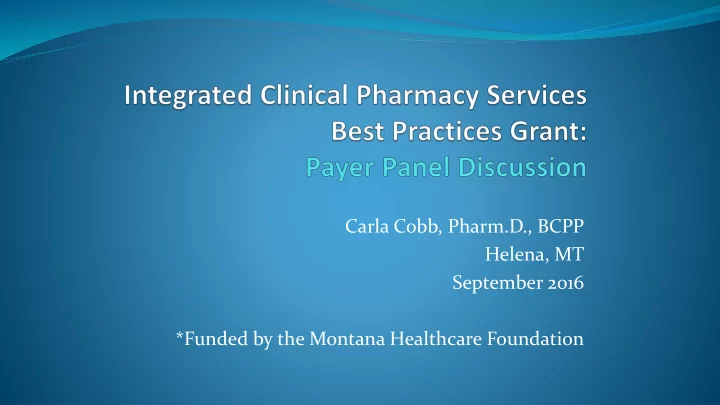

Carla Cobb, Pharm.D., BCPP Helena, MT September 2016 *Funded by the Montana Healthcare Foundation
Why Are We Here?
Pharmacists – The Most Underutilized Healthcare Professional
Gaps in Care Hypertension Hyperlipidemia Rx picked up Smoking cessation Goal not met 1. Jameson K et al. Int J Clin Pract 2013;12:1228-37 2. Ong KL et al. Hypertension 2007;49:69-75 3. CDC unpublished data 2011 http://www.cdc.gov/mmwr/preview/mmwrhtml/mm6036a4.htm?s_cid=mm6036a4_w 4. Fisher MA et al. J Gen Intern Med. 2010 Apr;25:284-90 5. Tamblyn R et al. Ann Intern Med. 2014;160:441-45
Unmet Needs in Montana Health Professional Shortage Areas (HPSA) http://kff.org/state-category/providers-service-use/
Workforce Issues Aging Population Increased Coverage
Workforce Projections 2010 - 2030 http://www.graham-center.org/content/dam/rgc/documents/maps-data-tools/state-collections/workforce-projections/Montana.pdf
Medication-Related Issues Poor adherence Polypharmacy High risk meds - opioids, anticoagulants, diabetes Hospital readmissions High cost of meds Opioid epidemic
Pharmacists Can Help Gaps in Care
Range of Outpatient Services Location Community Pharmacy Physician Practice Adherence Counseling Disease State Comprehensive Medication Examples Med Synchronization Management Management Part D Med Reviews Specialty Care Low Moderate High Intensity
MHCF Grant Develop toolkits Resources to help practices implement clinical pharmacy services Stakeholders meetings Six practice visits – September and October Conference (November 10 th in Helena) Best practices, key components of successful teams, barriers, solutions, funding opportunities, outcomes measures Identify practices and pharmacists for future pilots
Take Aways from Stakeholder Meeting #1 Team Approach to Care The Need: Aging population, more complex patients Benefits: shared workload, patient safety, outcomes, patient/provider satisfaction Barriers: information sharing, communication, training on new models, role delineation, efficiency, financial constraints Solutions: training, payment reform, technology, data sharing
What’s New CFHHS interim committee Focus on mental health, Alzheimer’s/dementia Bill LC170 “To require Medicaid payment of drug therapy management provided by clinical pharmacist practitioners”
Medication Management Research See handout Focused on outpatient setting, CMM Patients with chronic diseases Numerous additional disease state studies – anticoagulation, hypertension, diabetes, heart failure Unpublished data from health systems including Geisinger, Intermountain, Kaiser, VA
RiverStone Clinical Pharmacy Services 2015 621 patients: 288 new, 328 follow-up January 2015 to August 2016 127 patients with DM 99 patients had a repeat HbA1c done Mean decrease in HbA1c of 1.0% (1% decrease = $1200 cost saving * ) 2016 to-date 48 patients with mental illnesses seen together by psychiatric pharmacist and BH provider to facilitate care by PCP *Wagner E et al. JAMA 2001;285:182-9
Payment Options Fee for service Diabetes PMPM for care education coordination Preventive Services Shared savings – ACO models Medicare Transitions of care, chronic care Decreasing management Education stipends unnecessary care Incentive payments 340B Drug Pricing “Incident to” for quality measures Program billing
Payer Panel Allegiance – Dr. Jon Weisul Blue Cross – Dr. Jon Griffin Medicaid – Dan Peterson Pacific Source – Todd Lovshin State Health Plan – Marilyn Bartlett
Payer Panel Questions What are the strengths and limitations of the data that you have seen? What are your areas of concern regarding medication use? Which of your patient would benefit from clinical pharmacy services? What additional data are needed to show the value of clinical pharmacy services? What payment model(s) would you propose for clinical pharmacy services? What are the risks of adding clinical pharmacist practitioners as a provider type? What are the limitations from a payer perspective?
Questions to Run On In your small groups: Choose a spokesperson to report out What did you hear today that we should work on together? What will you commit to in your work setting?
Recommend
More recommend